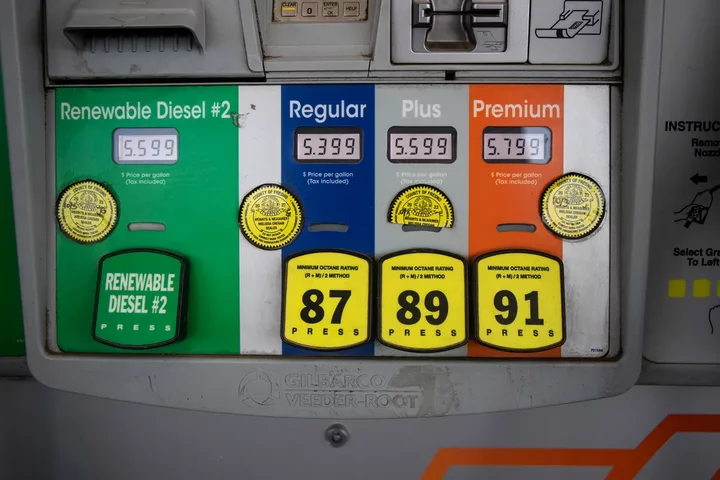Gas prices at a filling station in west Fresno on May 7, 2024. Photo by Larry Valenzuela, CalMatters/CatchLight Local
As a bill attempting to remedy California’s ongoing gas price spikes nears a final vote, questions about whether it could jeopardize worker safety have risen to the forefront.
The bill – Assembly Bill X2-1 – would require refineries to keep a to-be-determined minimum amount of gas supply on hand to help smooth out price spikes the state said happen when refineries go down for routine maintenance. The measure cleared the state Assembly earlier this month and the state Senate in a special legislative session last week, passing 23-9. A final vote on the bill, signing off on Senate changes, is expected in the Assembly today.
Those representing unionized workers in refineries argue that the legislation would jeopardize worker safety, and if storage requirements are untenable for refiners, closures and large job loss could follow. At issue is a provision in the bill that would give the California Energy Commission the ability to approve scheduled maintenance for refiners. State officials said this is meant to push refiners to be proactive in their maintenance planning, which, paired with higher reserves of gas supply on hand, would tamp down price spikes for Golden State drivers.
The state and the bill’s authors said current laws governing worker safety are not affected by the bill.
“Let me be clear, ABX2-1 does not prohibit a refinery from conducting important maintenance. Refiners can and should perform the maintenance they need to to keep their workers and facilities safe,” Assemblymember Gregg Hart, a Santa Barbara Democrat and one of the bill’s authors, said at an Oct. 7 state Senate hearing.
The bill’s latest version requires protecting the safety and health of “employees, local communities, and the public” in the process.
The State Building and Construction Trades Council represents many unionized workers employed in refineries. Jeremy Smith, chief of staff for the group, expressed concern that this plan could come at the expense of worker safety. If the state denies a refinery’s planned maintenance, he said, it could lead to “catastrophic breakdowns.”
“Maintenance must be done on a schedule based only on the condition of metals and infrastructure and the lifecycle of equipment such as vessels, pipes and valves,” he said at the hearing.
A worst-case scenario could be an explosion at a refinery, trades council president Chris Hannan told CalMatters. An explosion in 2015 at a Torrance refinery owned by ExxonMobil injured two workers and led to higher gas prices.
State energy commission vice chair Siva Gunda — who was appointed by Gov. Gavin Newsom, convener of the special session and key backer of the legislation — pushed back on such concerns. Not all refineries plan for maintenance the same way, he said, resulting in some having adequate supply for the market while others don’t “because there is no incentive” to keep a higher level of supply. The energy commission identified a 15-day supply of gas as a key point at which gas prices begin to shift.
The finer details of how the state’s plan would work are to be determined through a rulemaking process if the bill is passed. Gunda said the state would examine refiners’ current maintenance protocols during that process to understand if they are working.
“If existing protocols currently work, we will not touch them,” he said.
The state also pointed out that the legislation does not supersede other labor laws, such as Occupational Safety and Health Administration requirements.
“I continue to raise those same concerns that the decisions regarding scheduling of refinery and maintenance should not be left up to bureaucrats.”
— State Sen. Steven Bradford, Democrat from Inglewood
Prior legislation gave the state access to refiners’ data it is currently using to support its argument that the state’s price spikes are driven primarily by short supply during refinery maintenance. State Sen. Steven Bradford, an Inglewood Democrat and chairperson of the Senate special session committee, said he was “encouraged” by provisions in that earlier legislation that require meeting annually with labor representatives through an advisory committee, but noted that the six-person committee has yet to convene because Newsom’s administration hasn’t appointed its members yet.
Bradford previously carried legislation, unsuccessfully, that would have required the state to consult with labor groups about the impact on refinery employees and the communities around the refineries.
“I continue to raise those same concerns that the decisions regarding scheduling of refinery and maintenance should not be left up to bureaucrats, but should be in the hands of the men and women who do this work on a daily basis of operating these complex facilities,” he said at the hearing.
The bill has drawn strong criticism from groups representing the petroleum industry over whether new storage would need to be built to meet the bill’s requirements. The industry said the measure will lead to higher prices. It has also argued that it will need to build more costly storage, but amendments in the Assembly stipulate that the reserve requirements, to be determined by a special committee, cannot be larger than fits in existing tankage.
Chevron, which recently announced it is moving its headquarters to Texas, took the unusual step this week of submitting a letter to the chair of the Assembly Committee on Petroleum and Gasoline Supply contesting what it called “frankly ridiculous claims” of price gouging driving price spikes.
“We will do our part to ensure California consumers are informed about your role in shaping policies making life even more unaffordable,” the company said in the letter.
###
CalMatters.org is a nonprofit, nonpartisan media venture explaining California policies and politics.

CLICK TO MANAGE